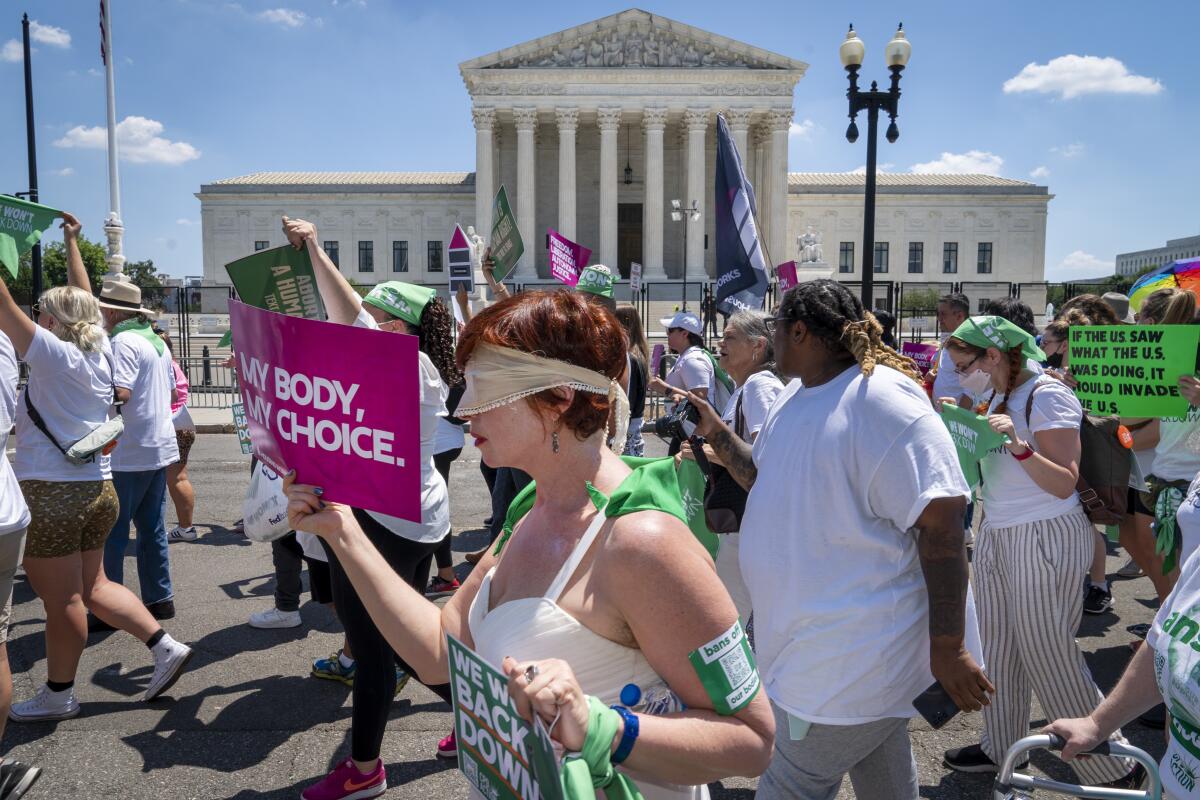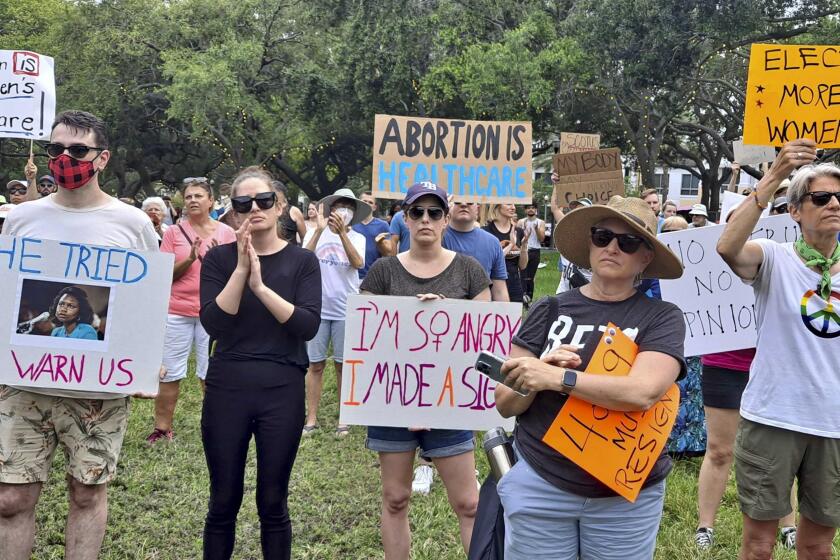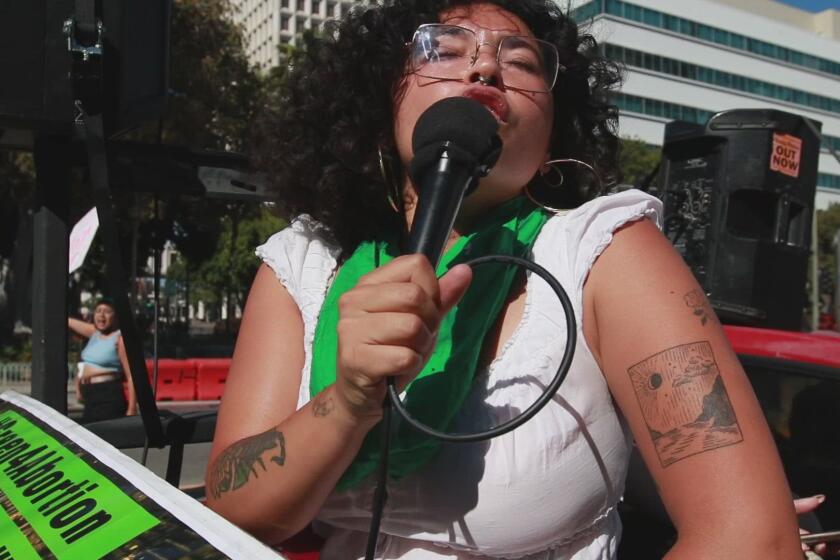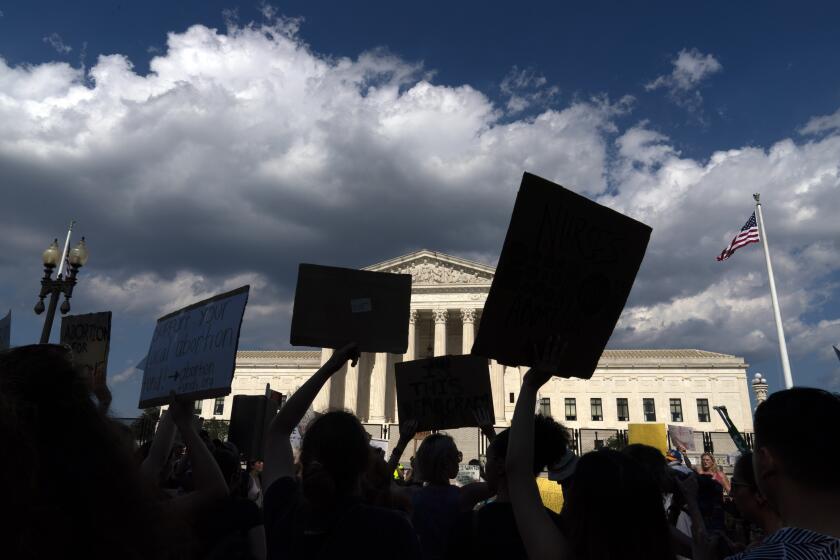Texas Supreme Court blocks order that allowed abortions to resume

- Share via
AUSTIN, Texas — The Texas Supreme Court late Friday blocked a lower court order that allowed clinics in the state to continue performing abortions even after the U.S. Supreme Court overturned its landmark Roe vs. Wade ruling that confirmed a constitutional right to abortion.
It was not immediately clear Saturday whether the clinics in Texas that resumed performing abortions just days ago had stopped offering their services again following the ruling. A hearing is scheduled for later this month.
The whiplash of Texas clinics turning away patients, rescheduling them, and now potentially canceling appointments again — all in the span of a week — illustrates the confusion and scrambling that has taken place across the country since the 1973 Roe vs. Wade decision was overturned.
An order by a Houston judge on Tuesday had reassured some clinics they could temporarily resume abortions up to six weeks into a pregnancy. Texas Atty. Gen. Ken Paxton quickly asked the state Supreme Court, which is stocked with nine Republican justices, to temporarily put that order on hold.
“These laws are confusing, unnecessary, and cruel,” said Marc Hearron, attorney for the Center for Reproductive Rights, after the order was issued Friday night.
The fall of Roe vs. Wade has shifted the battleground over abortion to courthouses around the country, as abortion foes looked to quickly enact statewide bans and the other side sought to buy more time.
Clinics in Texas — a state of nearly 30 million people — stopped performing abortions after the U.S. Supreme Court last week overturned Roe vs. Wade. Texas had left an abortion ban on the books for the past 50 years while Roe was in place.
Attorneys for Texas clinics provided a copy of Friday’s order, which was not immediately available on the court’s website.
Abortion providers and patients across the country have been struggling to navigate the evolving legal landscape around abortion laws and access.
In Florida, a law banning abortions after 15 weeks went into effect Friday, the day after a judge called it a violation of the state constitution and said he would sign an order temporarily blocking the law next week. The ban could have broader implications in the South, where Florida permits wider access to the procedure than its neighbors.
Abortion rights have been lost and regained in the span of a few days in Kentucky. A so-called trigger law imposing a near-total ban on the procedure took effect last Friday, but a judge blocked the law Thursday, meaning the state’s only two abortion providers can resume seeing patients — for now.
A Florida judge says he will temporarily block a 15-week abortion ban, but his ruling won’t take effect before the law is enacted, creating confusion for patients and abortion providers. A Kentucky judge temporarily blocked that state’s near-total ban on abortions.
The legal wrangling is almost certain to continue to cause chaos for Americans seeking abortions in the near future, with court rulings upending access at a moment’s notice and an influx of new patients from out of state overwhelming providers.
And women who do cross state borders to obtain an abortion could risk prosecution in their home states and are already facing greater restrictions.
Planned Parenthood of Montana this week stopped providing medication abortions to patients who live in states with bans “to minimize potential risk for providers, health center staff, and patients in the face of a rapidly changing landscape.”
Planned Parenthood North Central States, which offers abortions in Minnesota, Iowa and Nebraska, is telling its patients that they must take both pills in the regimen in a state that allows abortions.
The use of abortion pills has been the most common method to end a pregnancy since 2000, when the U.S. Food and Drug Administration approved mifepristone, the main drug used in medication abortions. Taken with misoprostol, a drug that causes cramping that empties the womb, it constitutes the abortion pill.
“There’s a lot of confusion and concern that the providers may be at risk, and they are trying to limit their liability so they can provide care to people who need it,” said Dr. Daniel Grossman, who directs the research group Advancing New Standards in Reproductive Health at UC San Francisco.
Dozens of people gathered in front of the federal courthouse in downtown Los Angeles on Monday to oppose the Supreme Court’s overturning of Roe vs.
Emily Bisek, a spokeswoman for Planned Parenthood North Central States, said that in an “unknown and murky” legal environment, the organization decided to tell patients they must be in a state where it is legal to complete the medication abortion -- which requires taking two drugs 24 to 48 hours apart. She said most patients coming from states with bans are expected to opt for surgical abortions.
Access to the pills has become a key battle in abortion rights, with the Biden administration preparing to argue that states can’t ban a medication that has received FDA approval.
Kim Floren, who operates an abortion fund in South Dakota called Justice Empowerment Network, said the development would further limit women’s choices.
“The purpose of these laws anyways is to scare people,” Floren said of states’ bans on abortions and telemedicine consultations for medication abortions. “The logistics to actually enforcing these is a nightmare, but they rely on the fact that people are going to be scared.”
Senate Constitutional Amendment 10 would, if approved by voters, further codify the state’s already progressive reproductive rights.
A South Dakota law took effect Friday that threatens felony punishment for anyone who prescribes medication for an abortion without a license from the South Dakota Board of Medical and Osteopathic Examiners.
In Alabama, Atty. Gen. Steve Marshall’s office said it is reviewing whether people or groups could face prosecution for helping women fund and travel to out-of-state abortion appointments.
Yellowhammer Fund, an Alabama-based group that helps low-income women cover abortion and travel costs, said it is pausing operations for two weeks because of the lack of clarity under state law.
“This is a temporary pause, and we’re going to figure out how we can legally get you money and resources and what that looks like,” said Kelsea McLain, Yellowhammer’s healthcare access director.
Laura Goodhue, executive director of the Florida Alliance of Planned Parenthood Affiliates, said staff members at its clinics have seen women driving from as far as Texas nonstop and without an appointment. Women past 15 weeks of pregnancy were asked to leave their information and promised a call back if a judge signs the order temporarily blocking the restriction and allowing abortions to begin again, she said.
The Supreme Court’s Roe vs. Wade ruling sets off a travel scramble, as abortion providers redirect patients to states that still allow the procedure.
Still, there is concern that the order may be only temporary and the law may go into effect yet again later, creating additional confusion.
“It’s terrible for patients,” she said. “We are really nervous about what is going to happen.”
More to Read
Sign up for Essential California
The most important California stories and recommendations in your inbox every morning.
You may occasionally receive promotional content from the Los Angeles Times.


















